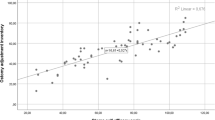Abstract
Introduction
Several studies indicate that self-efficacy may have profound positive effects on health promotion, clinical practice and other outcomes, like patients’ satisfaction and quality of life. However no studies on self-efficacy have been conducted in anorectal malformation (ARM) patients. Aim of the present study is to analyze the relationships between self-efficacy and satisfaction with postoperative care in ARM patients or in their parents and between self-efficacy, body image and sexual functioning in adult ARM patients.
Material and methods
A total of 237 patients from 2 to 49 years old (mean age = 13.35 years old) participated in the study. Questionnaires were sent to members of the Italian Association for Anorectal Malformation (AIMAR) by ordinary mail. All subjects were asked to fill in the AIMAR questionnaire in which information about the perceived severity of malformation and postoperative care satisfaction were collected. For patients under 16 years old, parents were asked to fill in a questionnaire and a parent self-efficacy scale concerning the perceived ability to overcome possible difficulties related to ARM. Participants above 16 years of age were asked to fill in the questionnaire, a self-efficacy scale and some body image and sexual functioning items.
Results
The main findings indicate that those patients who feel more efficacious are those who feel less embarrassed and shame about their body, feel less frequently unsatisfied of their body and their physical condition, and have the perception to be less limited in their sexual activities. Considering patients under 16 years old, results indicate that more parents feel efficacious, the more they are satisfied of the postoperative care, especially of some health care providers.
Conclusions
In ARM patients self-efficacy and parents self efficacy are correlated to important outcomes, respectively body image and sexual functioning in adults and postoperative care satisfaction in parents of those under 16 years old. Future longitudinal studies are needed to evaluate causal relations between the concepts considered.

Similar content being viewed by others
References
Ludman L, Spitz L (1995) Psychosocial adjustment of children treated for anorectal anomalies. J Pediatr Surg 30:495–499
Harmtan EE, Oort FJ, Aronson DC et al (2004) Critical factors affecting quality of life of adult of patients with anorectal malformations or hischsprung’s disease. Am J Gastroenterol 99:907–913
Poley MJ, Stolk EA, Tibboel D, Molenaar JC, Busschbach J (2006) Short term and long term related quality of life after congenital anorectal malformations and congenital diaphragmatic hernia. Arch Dis Child 89:836–841
Goyal A, Williams J, Kenny S et al (2006) Functional outcome and quality of life in anorectal malformations. J Pediatr Surg 41:318–322
Bai Y, Yuan Z, Wang W et al (2000) Quality of life for children with fecal incontinence after surgically corrected anorectal malformation. J Pediatr Surg 35:462–464
Bandura A (1997) The exercise of control. WH Freeman, New York
Aljasem LI (2001) The impact of barriers and self-efficacy on self-care behaviours in type 2 diabetes. Diabetes Educ 27:393–404
Sarkar U, Ali S, Whooley MA (2007) Self-efficacy and health status in patients with coronary heart disease: findings from the heart and soul study. Psychosom Med 69:306–312
Marks R, Allegrante JP (2005) A review and synthesis of research evidence for self-efficacy-enhancing interventions for reducing chronic disability: implications for health education practice (part II). Health Promot Pract 6:148–156
Curtin RB, Waltrs BA, Schatell D et al (2008) Self-efficacy and self-management behaviours in patients with chronic kidney disease. Adv Chronic Kidney Dis 15:191–205
Coleman P, Karraker KH (2000) Parenting self-efficacy among mothers of school-age children: conceptualization, measurement and correlates. Fam Relat 49:13–24
Donovan W, Leavitt LA, Walsh RO (1990) Maternal self-efficacy: illusory control and its effect on susceptibility to learned helplessness. Child Dev 61:1638–1647
Wells-Parker E, Miller DI, Topping S (1990) Development of control of outcome scales and self-efficacy scales for women in four life roles. J Pers Assess 54:564–575
Aminoff D, La Sala E, Zaccara A (2006) Follow-up of anorectal anomalies: the Italian parents’ perspective. J Pediatr Surg 41:837–841
Hannemann M, Mirjam A, Sprangers E et al (2001) Quality of life in patients with anorectal malformations or Hirschsprung’s disease: the development of a disease-specific questionnaire. Dis Colon Rectum 44:1650–1660
Johnston C, Mash EJ (1989) A measure of parenting satisfaction and efficacy. J Clin Child Psychol 18:167–175
Bandura A (1986) Social foundations of thought and action: A social cognitive theory. Englewood Cliffs, NJ, Prentice-Hall
Bandura A, Adams NE, Hardy AB, Howells GN (1980) Tests of the generality of self-efficacy theory. Cognit Ther Res 4:39–66
Jenetzky E, Schwarzer N (2006) ARM: aftercare and impact from the perspective of the family. In: Holschneider AM, Hutson JM (eds) Anorectal malformations in children. Springer, Berlin, pp 459–469
Jenetzky E (2007) Prevalence estimation of anorectal malformations using German diagnosis related group system. Pediatr Surg Int 23:1161–1165
Acknowledgments
The authors and AIMAR would like to thank the Johnson&Johnson Foundation for the funds received for this project as well as the patients and parents who participated into this study.
Author information
Authors and Affiliations
Corresponding author
Rights and permissions
About this article
Cite this article
Grano, C., Aminoff, D., Lucidi, F. et al. Self-efficacy, postoperative care satisfaction, body image and sexual functioning in ARM patients. Pediatr Surg Int 24, 1201–1205 (2008). https://doi.org/10.1007/s00383-008-2233-6
Published:
Issue Date:
DOI: https://doi.org/10.1007/s00383-008-2233-6




